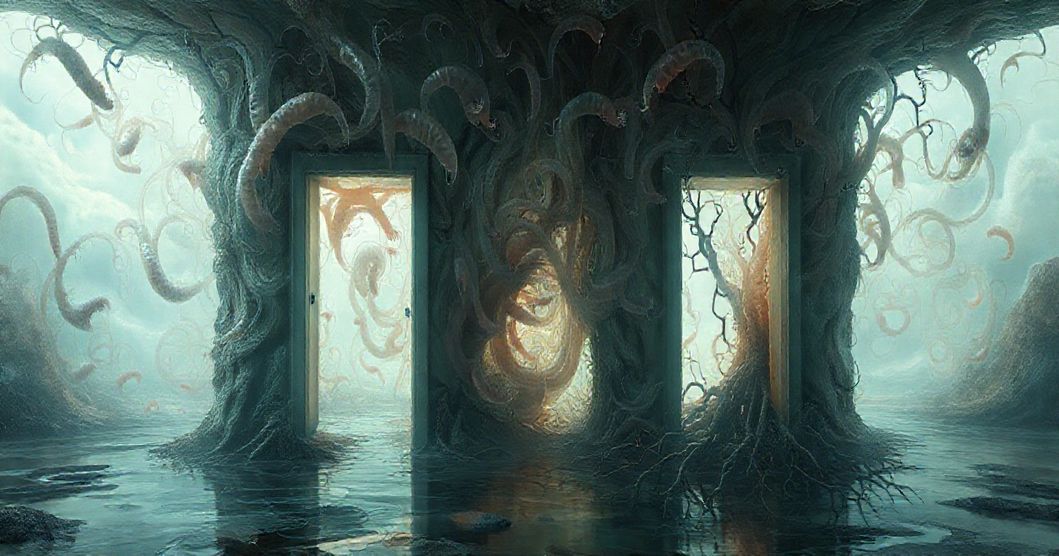Core Symbols: Maggots, Doorways, and Echoes in Dreams
Maggots in dreams are rarely literal; they’re emotional messengers wrapped in visceral imagery. In nature, maggots are decomposers, turning decay into nutrients—a paradox that mirrors the dream world’s language. When you chase them, you’re not just pursuing something repulsive; you’re confronting the parts of yourself you’ve deemed “rotten” or unworthy of attention. Doorways in dreams act as psychological thresholds, symbolizing transitions between conscious awareness and the subconscious. An open doorway might represent a new opportunity, while a closed one could signify avoidance of change. The “echoes” tie to repetition: these aren’t random dreams but persistent themes, urging you to revisit unresolved issues.
Consider a friend who dreamed of chasing maggots through a series of identical doorways. Each door led to a room filled with half-rotted objects, and the maggots multiplied with each step. She later realized she’d been avoiding conversations about her failing marriage, letting resentment fester like the decay in her dream. The maggots weren’t a warning; they were her subconscious’s way of saying, “This rot needs tending.”
Psychology Lens: From Repulsion to Transformation
Want a More Personalized Interpretation?
Get your own AI-powered dream analysis tailored specifically to your dream
🔮Try Dream Analysis FreeFreud might view maggots as repressed desires—taboos or forbidden urges that feel “slimy” to confront. Jung, however, would see them as archetypal symbols of the anima/animus’s shadow: the parts of ourselves we reject as ugly or worthless. In neuroscience, the amygdala processes disgust as a survival instinct, triggering the “fight-or-flight” response. When this emotion surfaces in dreams, it’s the brain’s way of flagging emotional “danger zones” that need regulation.
Culturally, maggots carry dual meanings. In alchemical traditions, putrefaction (the stage before gold) requires decay—maggots are the workers of transformation. In Eastern philosophy, they echo the Buddhist concept of anicca (impermanence): what feels “dead” now might be reborn. This contrast—Western revulsion vs. Eastern acceptance—highlights the dream’s nuance: maggots aren’t inherently negative; they’re a mirror of how we judge our own decay.
Life Triggers: When Decay Becomes a Dream
These dreams often arise during periods of emotional stagnation. If you’ve recently ended a toxic relationship but haven’t processed the loss, maggots might chase you through doorways of unspoken apologies. A project at work that’s failing could manifest as decaying spaces, with maggots symbolizing your inability to let go of perfectionism. Digital overwhelm also plays a role: endless notifications, social media comparisons, and the “digital rot” of unfiltered information can seep into dreams, where maggots become the visual of this mental clutter.
A common trigger is the fear of “not being enough.” If you’re in a career or relationship where you feel “rotting from the inside out,” the dream might literalize that feeling. The doorways then become the “what ifs”: What if I quit this job? What if I speak up? The chase is your subconscious testing the courage to step through those thresholds.
What To Do Next: From Dream to Action
Short-Term Reflection: Journal the Details
Start by writing down every element of the dream: the color of the maggots, the texture of the doorways, how you felt (fear, disgust, curiosity). Ask: What in my life feels “decayed” right now? Is it a relationship, habit, or belief system that’s no longer serving you? This reflection turns abstract imagery into concrete questions.
Medium-Term Experimentation: Create “Decay Rituals”
Symbolically release what’s stagnant. If the dream felt like chasing, try a “letting go” practice: write down your fears or regrets on paper, tear it into small pieces, and place them in a container of water (maggots thrive in moisture, so this mirrors the dream’s fluidity). Visualize the water absorbing the paper, carrying the “rot” away. Do this weekly to process lingering emotions.
Long-Term Integration: Embrace the “Putrefaction” Phase
Notice if you resist change. Maggots in dreams often appear when we cling to the past. Ask: What doorways am I avoiding? A new job, a difficult conversation, or a creative project you’ve shelved. Small steps matter: take one action toward that doorway each week. Remember, decay isn’t failure—it’s the soil for new growth.
FAQ
Q: What does it mean if I’m chasing maggots in my dream?
A: Chasing suggests you’re actively avoiding or confronting something unpleasant. It may signal unresolved emotions tied to decay—grief, regret, or stagnation. The chase itself is your subconscious urging you to face what you’ve been running from.
Q: Is this a negative dream symbol?
A: No. Maggots represent transformation, not destruction. The discomfort is a signal to address neglected parts of your life, much like how maggots turn waste into life-giving soil.
Q: How do I connect this to my waking life?
A: Ask: What “decay” am I ignoring? What doorways (opportunities or challenges) am I avoiding? Journaling these questions and taking small steps toward them can turn the dream’s “echoes” into meaningful action.
